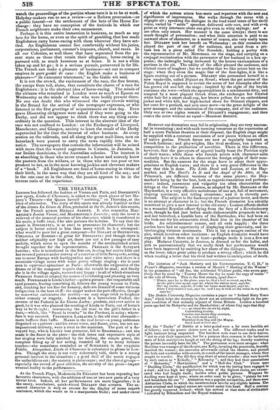The historian of "Jack Moriarty and his Contemporaries, T. C.
D.," in Fraser's Magazine, mentions a version of Moore's "Meeting of the Waters" in the possession of "old Joe, the celebrated Wicklow guide, who swore posi- tively that he stood by ' Tammy Moore the day Ise made the copy of verses ' " in the vale of Ocoee. This is the first stanza, apud Joe- " Blazes, says he to the place, says he, that's half no sweet, says he,
As the place over ayant, says he where the waters meet, says he. Oh ! my darlin', says he, it's the last Mane must depart, says he, Afore I disremimber you, says he, and I say it with all the veins in my heart, says he."
The Dublin University Magazine contains a paper on "Ireland Sixty Years Ago," which helps the memory to throw not an uninteresting light on the pm- sent condition of that unlucky adjunct of Great Britain. London a hundred years ago had its Mohawks and its klawkubites ; of whom Gay says that they
— go about the streets by night, Committing cruelty.
Coaches and chairs they overturn, Yea, carts most easily;
Therefore from Gog and eke Magog, Good Lord deliver MN."
But the "Bucks" of Dublin at a later period were a far more horrible set of fellows; and the poorer rioters were as bad. The different trades used to fight, business being suspended. The butchers were wont to use their knives, "not to stab their opponents, but for a purpose then common in the barbarous state of Irish society—to hough or cut the string of the leg; thereby rendering the person incurably lame for life." The gownsmen were mere savages: when Sheridan was manager of the theatre, one Kelly, invading the penetralia, brutally insulted the women ; his comrades afterwards visited the theatre, and pierced the beds and wardrobes with swords, in search of the latent manager, whom they sought to murder. Nor did they stop short of actual murder : men were known by such names RS Kilkelly," " Kilcoachy "; and they had their associations of "Mohawks," " Hawkabites," and a " Hell-fire Club." There were "Duelling Clubs," the qualification for which was the having been engaged in a duel; and ten high law dignitaries, some of the highest ranks, are enume- rated who had fought duels; besides other public persons. Weapons for duelling were kept at inns; where an order used to be given, "pistols for two and breakfasts for one "! Abduction was a popular occupation, and there were Abduction Clubs, in which the members drew lots for any eligible heiress. The most criminal and tragical scenes are recited under this head. Haifa century has greatly improved Ireland; which has arrived at that state of civilisation i ndicated by Ribandism and the Repeal tnadnese.


























 Previous page
Previous page